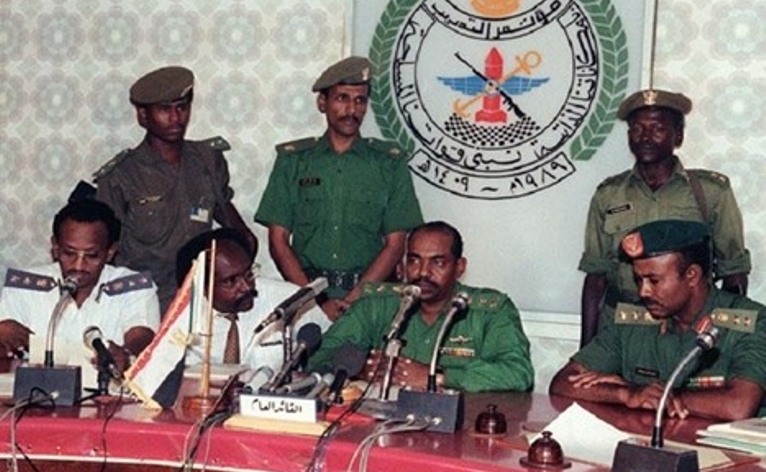Al-Bashir denies any role for Sudanese Islamists in 1989 coup
December 20, 2022 (KHARTOUM) – The ousted Sudanese President Omer al-Bashir said Tuesday he is fully responsible for the overthrow of an elected government in 1989 and denied any role for his Islamist group and military members of the ‘Revolutionary Command Council’ in the planning and execution of the coup.
“I stand before this court, and I say with pride and dignity, that I am the leader and instigator of the National Salvation Revolution, and I bear full responsibility for what happened in June 1989,” al-Bashir told the court.
He went further to add sarcastically that he was “following with pleasure” the prosecution’s attempts to bring videos to prove his involvement in the coup.
Al-Bashir said that all the indicted members of the Revolutionary Command Council have no role in the planning and implementation of the overthrow of the elected government, adding they were selected to represent their military units and some regions.
Also, he denied the involvement of civilian Islamists who took part in the putsch, adding, “It was a purely military action and we did not need civilians to help us.”
Bashir’s statement before the court contradicts the account of the late Islamist leader Hassan al-Turabi and several other Islamist leading figures who admitted that the coup was planned and carried out by the National Islamic Front (NIF).
In a documentary released after his death according to his will, al-Turabi told al-Jazeera TV that al-Bashir did not know about the coup until the day before the implementation. At the time, the Islamist military was in South Sudan fighting the SPLM/A rebels.
The prosecution said earlier that there are two groups of civilians linked to the coup.
The first, which participated in the planning, execution and determination of D-Day, including the late Hassan al-Turabi, Ali Osman Mohamed Taha, Yassin Omer Imam, Ibrahim Alsenosi, and Awad al-Jaz. The second was the liaison group responsible for connecting civilian and military elements and organizing meetings; its members were Ali Karti, the late Zubair Ahmed Alhassan, Ahmed Mohamed Ali Alfashashawiya, and Nafie Ali Nafie.
Al-Bashir said the coup was triggered by the bad conditions of the Sudanese army troops and the lack of weapons and ammunition as they were fighting the SPLA in southern Sudan.
In fact, the NIF decided to overthrow the civilian government because it was preparing to sign a political agreement providing to repeal the Islamic law and separate the state and religion.
The ousted leader, a number of civilian and military leaders of the Islamic Movement, and 3 leaders of the Popular Congress Party who were formerly part of the NIF are charged with undermining the constitutional order and overthrowing an elected authority. He and his accomplices face the death penalty if convicted under Sudanese criminal law.
Worthless statement
A member of the prosecution team, Lawyer Al-Moez Hadrat, told Sudan Tribune that the current stage of the trial is the stage of interrogation of the accused after the presentation of evidence against him.
He said that al-Bashir’s statement contradicts the recorded and audio evidence presented against him. Also, he pointed out that there are other witnesses and defendants who made statements that can be used as evidence against him.
“Al-Bashir, as a defendant, was supposed to defend himself, but he did not do that. Instead, he made a political pleading that has no legal value” Hadrat further stressed.
The court rejected the TV documentary where al-Turabi detailed how they organized the June 30, 1989 coup due to his death.
However, the court before the verdict would consider other evidence about the organization of the coup by the Sudanese Islamists.
(ST)

